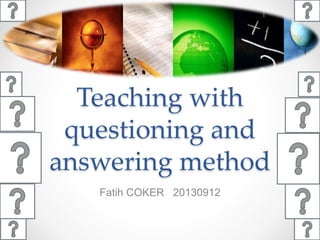Teaching with questioning and answering method
•Transferir como PPTX, PDF•
7 gostaram•7,254 visualizações
Outline: Categories of Questions Uses of Questions Types of Questions According to Purpose Types of Questions According to Level Characteristics of Good Questions Questioning Skills and Conduct of Good Questioning Handling Student’s Response & Handling Student’s Questions Sequence of Questions
Denunciar
Compartilhar
Denunciar
Compartilhar

Recomendados
Recomendados
Mais conteúdo relacionado
Mais procurados
Mais procurados (20)
Destaque
Destaque (20)
Activities and materials to encourage aesthetic development through

Activities and materials to encourage aesthetic development through
Microteaching introduction with example of lesson plan

Microteaching introduction with example of lesson plan
Methods and strategies of teaching by Jerrin Issac

Methods and strategies of teaching by Jerrin Issac
Semelhante a Teaching with questioning and answering method
Semelhante a Teaching with questioning and answering method (20)
Intrinsically Motivating Student Achievement by Alternative Assessment

Intrinsically Motivating Student Achievement by Alternative Assessment
Último
Mehran University Newsletter is a Quarterly Publication from Public Relations OfficeMehran University Newsletter Vol-X, Issue-I, 2024

Mehran University Newsletter Vol-X, Issue-I, 2024Mehran University of Engineering & Technology, Jamshoro
Último (20)
On National Teacher Day, meet the 2024-25 Kenan Fellows

On National Teacher Day, meet the 2024-25 Kenan Fellows
Beyond_Borders_Understanding_Anime_and_Manga_Fandom_A_Comprehensive_Audience_...

Beyond_Borders_Understanding_Anime_and_Manga_Fandom_A_Comprehensive_Audience_...
HMCS Max Bernays Pre-Deployment Brief (May 2024).pptx

HMCS Max Bernays Pre-Deployment Brief (May 2024).pptx
Python Notes for mca i year students osmania university.docx

Python Notes for mca i year students osmania university.docx
Exploring_the_Narrative_Style_of_Amitav_Ghoshs_Gun_Island.pptx

Exploring_the_Narrative_Style_of_Amitav_Ghoshs_Gun_Island.pptx
Unit 3 Emotional Intelligence and Spiritual Intelligence.pdf

Unit 3 Emotional Intelligence and Spiritual Intelligence.pdf
Fostering Friendships - Enhancing Social Bonds in the Classroom

Fostering Friendships - Enhancing Social Bonds in the Classroom
Micro-Scholarship, What it is, How can it help me.pdf

Micro-Scholarship, What it is, How can it help me.pdf
HMCS Vancouver Pre-Deployment Brief - May 2024 (Web Version).pptx

HMCS Vancouver Pre-Deployment Brief - May 2024 (Web Version).pptx
This PowerPoint helps students to consider the concept of infinity.

This PowerPoint helps students to consider the concept of infinity.
Food safety_Challenges food safety laboratories_.pdf

Food safety_Challenges food safety laboratories_.pdf
Teaching with questioning and answering method
- 1. Teaching with questioning and answering method Fatih COKER 20130912
- 2. Outline • Categories of Questions • Uses of Questions • Types of Questions According to Purpose • Types of Questions According to Level • Characteristics of Good Questions • Questioning Skills and Conduct of Good Questioning • Handling Student’s Response & Handling Student’s Questions • Sequence of Questions
- 3. Categories of Questions • Knowledge (who, what, whom, where, why, how) • Comprehension (retell) • Analysis (What are the parts of.... ? features of....? Classify according to....) • Application (How is.... an example of....? How is.... related to.....? Why is.... significant....?) • Synthesis (What would infer from? What ideas can you add to? How would you design a new....? What would happen if you combine...?) • Evaluation (Do you agree that...? What do you think about...? What is the most important.....? Place the ff. in order of priority. How would you decide about...? What criteria do you need to use to assess....?)
- 4. Uses of Questions • To stimulate pupils to think • To motivate pupils • To diagnose pupil’s difficulties • To discover pupil’s interest • To help pupils organize and evaluate • To aid pupils to relate pertinent experiences to the lesson • To focus pupil’s attention • To develop new appreciation and attitudes • To provide drill or practice • To show relationships such as cause and effect • To encourage the application of concept
- 5. Types of Questions According to Purpose • For assessing cognition • For verification • For creative thinking • For evaluating • For productive thinking • For motivating • For instructing
- 6. Types of Questions According to Level •Low level •High level •Convergent •Divergent
- 7. Characteristics of Good Questions brief, clear, and unequivocal not be lifted from the book suited to the age, experience, and ability of the student deal with only one idea vary in difficulty applicable to all students thought-provoking and challenging are not self-answering relevant to the lesson under discussion in good grammatical form
- 8. Questioning Skills and Conduct of Good Questioning • Varying type of questions • Ask questions in conversational tone • Asking non-directed questions • Calling on non-volunteers • Students should not be called in fixed order • Allowing for sufficient wait time • Courtesy between the teacher and his students should prevail during the questioning session
- 9. Handling Student’s Response • Show appreciation for any answer • Wrong answers should never be allowed to go uncorrected • Giving appropriate praise for high quality responses • Following up a student’s response with related questions • Answering in chorus should not be allowed by the teacher • Teacher should be glad to welcome questions • Irrelevant and inane questions should not be entertained • Questions should be thrown first to the whole class for an answer or discussion • Questions should be in correct grammar or in good language Handling Student’s Questions
- 10. Sequence of Questions •Easy •Normal Typical Common Ordinary •Difficult
- 11. Thank you for listening. Fatih COKER 20130912